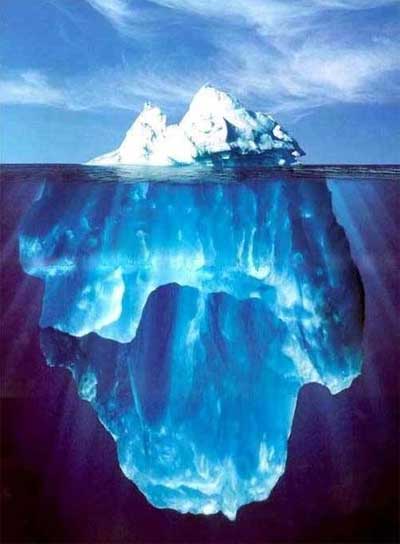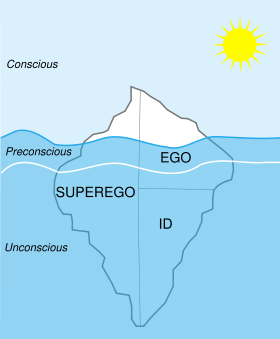Wilderness as states of being and beingness in the world.
![]()
Wild within and without, in the search for a motive for nature’s murder.
Freud's view | Ego & Id | Hindu View | Map of wild areas | Signals of change | A Student esay
Bill Mckibben suggests that we have killed nature, how is that possible given our education and sensitivity?
"By Weltanschauung, then, I mean an intellectual construction which gives a unified solution of all the problems of our existence in virtue of a comprehensive hypothesis, a construction, therefore, in which no question is left open and in which everything in which we are interested finds a place. It is easy to see that the possession of such a Weltanschauung is one of the ideal wishes of mankind. When one believes in such a thing, one feels secure in life, one knows what one ought to strive after, and how one ought to organize one's emotions and interests to the best purpose. If that is what is meant by a Weltanschauung, then the question is an easy one for psychoanalysis to answer . . . ."
Sigmund Freud, Civilization and Die Weltanschauung, 1918
Though outdated, Freudian analysis reveals inner conflicts among three facets of our gestalt: the Ego and Superego sit above the more massive and steering Id.


The icebergs are a metaphor that suggest that personality is largely a veneer beneath which evolutionary and un conscious drives direct the individual to either engage or flee from the world. Engaging the world can mean fighting the natural conditions in a struggle for existence, or cooperating with the natural conditions of life.
Thus in the Brahmanistic tradition (Hindu), for example, the illusion of the material world created a tension in believers that can lead to never resolving the inner and innate conflicts (sensory delusions).
On the other hand resolution of the tensions may occur through ritualized steps. Here a believer (acolyte) can move in steps from the initial desire to play, toward love, into devotion, and ultimately to surrender. This places the novice on a path to recovering –but does not assure regaining– the oneness we once had but lost in the journey from conception to birth.
The rich quality of this tradition is indicated by the concept of samsara and by the fact that Jainism and Buddhism have derived important principles from the above basic motif. Jainism extends the ethical realm to all life and Buddhism in its varied sects requires a reverence for life.
Samsara, a noun, in Hinduism & Buddhism it refers to the cycle of death and rebirth to which life in the material world is bound.
Jainism, Buddhism, the Koran and the book of Genesis all explicitly or implicitly direct us to care for the world in which we are embedded, but may not fully understand, sense or with which we may even feel an emotional kinship.
Freud's view | Ego & Id | Hindu View | Map of wild areas | Signals of change | A Student esay
Map of the world's remaining wild areas (dark green) that have far less human impact than other places.
Any environment is a fusion of each facet where the entirety is greater than the mere sum of the parts.
Physical to every action there is an equal and opposite reaction
Chemical everything has to go somewhere – conservation of matter
Biological every conversion of energy into matter is inefficient
Freud's view | Ego & Id | Hindu View | Map of wild areas | Signals of change | A Student esay
Signs of a change in behavior.
So when Aldo Leopold asks for an extension of ethics what does that mean?
Freud's view | Ego & Id | Hindu View | Map of wild areas | Signals of change | A Student esay
When he insists that we must extend our ethics in a sequence what does that imply, given the divided self in a fused realm of actions and reactions?
Keenan's responses:
". . . wilderness is still calling us, and can save us from the downfall we are sliding towards. As one family of the planet we
need to get back together, and form a plan for our future that does not leave any one thing out."
We feel something missing in its absence. Species other than man have rights too. Having consumed all the requisites of our materialistic society, does nature, the basis of our existence, have the right to live on?
“Do we have enough reverence for life to concede to wilderness this right?” Williams 95.
"this is due to the idea that “man may seek such scenes and find pleasure in the discovery, but there is a mysterious fear that comes over him and hurries him away. The sublime features of nature are too severe for a lone man to look upon and be happy (Nash 79). Technology has made the gap between humans and their environment vast, and equally insidious at the same time. Howard Zahniser suggests, “to get away from technology that gives us the illusion of mastering rather than belonging to the environment” (Nash 255).
"The . . . human race through evolution has been anthropocentric. Our disregard of every other form of life on the our trampled planet now forces us to act. And validates my idea that the disconnection from nature is potentially lethal to the every form of life; humans are in no way exempt, neither is wilderness."
"I believe wilderness is still calling for us, . . ."
"Wilderness needs protection immediately as … a self-willing system that is now so rare on the planet we have coveted. Humans have become obsessed with material goods, and in so doing, draw happiness from the possessions they can obtain."
"I will end this essay about my self, society, and our environmental problems with a most accurate and motivating quote from Williams. “My greatest hope, which is a very slender on, is that we will at least find the courage to make ourselves rational and morally autonomous adults, secure enough faith that life is good and to be preserved, to reconcile the grosser forms of evil and name them and confront them.” There is no more time for small fixes, short term plans and mitigation, for once we need to completely put Earth's needs above our own. Instead of fragmented patches of wilderness to simply use or have for humans needs to shift to a earth fragmented with patches of dense growth with the surrounding larger percent of land for the others on this planet. Economics aside also, finally another species can be allowed the time to benefit from this earth. Civilization will morally improve immediately as they together sacrifice; find new love for each other, themselves, and the earth. The environment will also finally be able to benefit from the lack of human interference, as care for non-humans will be a new thought. This mutual happiness is the result of my equation for the future of earth. It seems to be obvious."
“Community is extremely intimate. When we talk about humor, I love that I know when you're home because there is laughter in the room, there is humor, there is shorthand. That is about community. I think community is a shared history, it's a shared experience. It's not always agreement. In fact, I think that often it isn't. It's the commitment, again, to stay with something — to go the duration. You can't walk away. It's like a marriage, only I think it's more difficult to divorce yourself from community than it is to a human being because the strands are interconnected and so various.”
(Williams Interview with Scott London)
"What we perceive as non- human, outside of us, is actually in direct relationship with us."
Freud's view | Ego & Id | Hindu View | Map of wild areas | Signals of change | A Student esay
Ethics in the context of his writing and other writings means: a willing curtailment of one’s behavior without regard to consequences, rewards, or sanctions.
Problem means: the recognition of a difference between an existing and a desired state of affairs.
extension refers to the action of moving from one confined set of assumptions about behavior to another beyond the initial conjectures. For example She ,“by extension taking the same line of argument further,” agreed.
Freud's view | Ego & Id | Hindu View | Map of wild areas | Signals of change | A Student esay
![]()
Henry Beston | Terry Tempest Williams | Wallace Stegner | Willa Cather | E.O. Wilson's warnings.